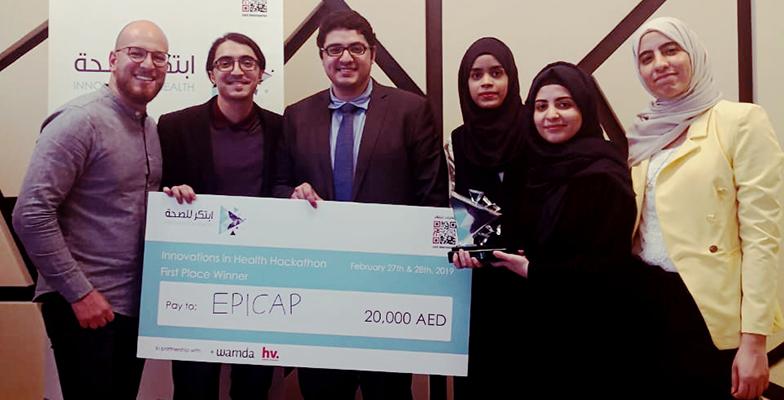- About
- Admissions
- Study at AUS
- Prospective Students
- Bachelor's Degrees
- Master's Degrees
- Doctoral Degrees
- Admission Publications
- International Students
- Contact Admissions
- Grants and Scholarships
- Sponsorship Liaison Services
- Testing Center
- New Undergraduate Student Guide
- New Graduate Student Guide
- File Completion
- New Student Orientation
- Payment Guide
- Executive Education
- Students with Disabilities
- Academics
- Life at AUS
- Research
- Contact Us
- Apply Now
- .

CEN students win first place at the Ministry of Health and Prevention (MOHAP) Hackathon on Innovations in Health
Engineering students from American University of Sharjah (AUS) were declared winners at the recently-held Ministry of Health and Prevention (MOHAP) Hackathon on Innovations in Health for their project entitled “Smart Wearable Cap for Epileptic Patients.” Graduate students in biomedical engineering Mohanad Alkhodari, Aseel Alatoom, Abdelrahman Mostafa, Jumana Farhat and Shafiya Sabah received a trophy and AED 20,000 for their win.
Held in Sharjah, the event saw more than 45 participants from all over the UAE competing to provide a complete business model for an innovative healthcare project related to either a chronic or a mental health disease. This required the students to work on a value proposition model, customer segments, cost structure, key resources, key activities, and revenue streams, and the technology behind the project. The teams pitched their ideas to a panel of judges from MOHAP and Hikma.
“We chose to focus on epilepsy, which usually causes random seizures that make it difficult for patients to go about their life without interruptions. Seizures may cause the patient or others harm should they occur while performing daily life tasks like working, driving or going out for a walk. Seizures are usually predicted using EEG electrodes connected to the patients head. So instead of connecting wires and electrodes to the patient, we proposed the idea of building a wearable smart cap — EpiCap, to predict seizures beforehand,” said Alkhodari, a member of the winning team.
He explained: “This allows the patients to protect themselves and others during a seizure and provide them with ample time to take the needed medication. The cap can be connected to a phone application to be used by the patient, the parents, and doctors to alert them.”
Speaking about the experience gained from participating in the Hackathon, Alatoom said:
“It was a great experience that took us away from the usual work we do and instead got us to think outside the box. I also got to meet people from different backgrounds including the organizers from Wamda, and to forge strong connections with my teammates, which was both educational and fun. I really want to thank the Biosciences and Bioengineering Research Institute at AUS for the support it provided me and my colleagues.”
The winning team was mentored by Dr. Hasan Al Nashash, Professor of Electrical Engineering and Interim Director of Biosciences and Bioengineering Research Institute.

